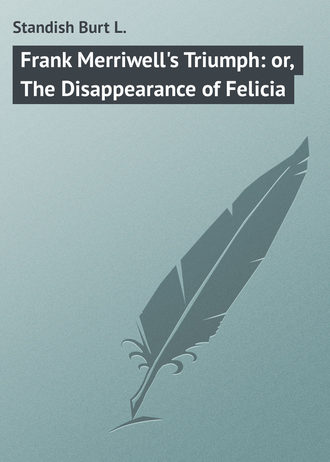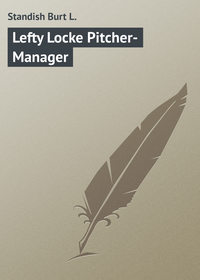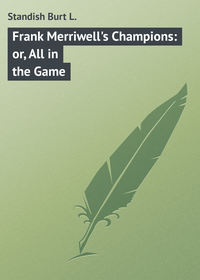 полная версия
полная версияFrank Merriwell's Triumph: or, The Disappearance of Felicia
At this point Worthington broke into a shriek of maniacal laughter.
“Go back to your grave!” he yelled. “No plotting there! No violence – nothing but rest!”
“Now, I tell you what, mates,” broke in Cap’n Wiley protestingly; “between spook voices and this maniac, I am on the verge of nervous prostration. If I had a bottle of Doctor Brown’s nervura, I’d drink the whole thing at one gulp.”
Having shouted the words quoted, Worthington crouched on the ground and covered his face with his hands.
“What do you think about it now?” whispered Bart in Frank’s ear. “Whoever it is, he knows about Benson Clark and his claim. He knows you buried Clark. How do you explain that?”
“I can see only one explanation,” answered Frank, in a low tone. “This man has been near enough at some time when we were speaking of Clark to overhear our words.”
“This man,” muttered Wiley. “Why, jigger it all! it claims to be an ethereal and vapid spook.”
“Don’t be a fool, Wiley!” growled Hodge. “You know as well as we do that it is not a spook.”
“You relieve me greatly by your assurance,” said the sailor. “I have never seen a spook, but once, after a protracted visit on Easy Street, I saw other things just as bad. I don’t think my nerves have gained their equilibrium.”
“What will we do about this business, Merry?” asked Hodge.
“I don’t propose to be driven away from here by any such childish trick,” answered Frank grimly. “We will not build another fire to-night, for I don’t care to take the chances of being picked off by any one shooting at us from the dark. However, we will stay right here and show this party that he cannot frighten us in such a silly manner.”
“That’s the talk!” nodded Hodge. “I am with you.”
“Don’t forget me,” interjected the sailor.
“You!” exclaimed Frank sharply. “How can we depend on a fellow who sleeps at his post when on guard?”
“It’s ever thus my little failings have counted against me!” sighed Wiley. “Those things have caused me to be vastly misunderstood. Well, it can’t be helped. If I am not permitted to take my turn of standing guard to-night, I must suffer and sleep in silence.”
Having said this in an injured and doleful manner, he retreated to the tent and flung himself on the ground.
Frank and Bart sat down near the tent, and listened and waited a long time, thinking it possible they might hear that voice once more. The silence remained undisturbed, however, save for the gurgle of the little brook which ran near at hand.
CHAPTER V.
WILEY’S DISAPPEARANCE
Night passed without anything further to disturb or annoy them. The morning came bright and peaceful, and the sun shone pleasantly into the Enchanted Valley. Wiley turned out at an early hour, built the fire, and prepared the breakfast.
“Seems like I had an unpleasant dream last eve,” he remarked. “These measly dreams are coming thick and fast. Night before last it was pirates; last night it was spooks. It seems to be getting worse and worse. If this thing keeps up, I will be in poor condition when the baseball season opens in the spring.”
“Then you intend to play baseball again, do you, cap’n?” asked Merry.
“Intend to play it! Why, mate, I cannot help it! As long as my good right arm retains its cunning I shall continue to project the sphere through the atmosphere. To me it is a pleasure to behold a batter wildly swat the empty air as one of my marvelous curves serenely dodges his willow wand. I have thought many times that I would get a divorce from baseball and return to it no more. But each spring, as the little birds joyfully hie themselves northward from their winter pilgrimage in the Sunny South, the old-time feeling gets into my veins, and I amble forth upon the turf and disport myself upon the chalk-marked diamond. Yes, I expect to be in the game again, and when little Walter gets into the game he gets into it for keeps.”
“What if some one should offer you a prominent position at a salary of ten thousand a year where you would be unable to play baseball?” inquired Merry, with a sly twinkle in his eye. “You’d have to give it up then.”
“Not on your tintype!” was the prompt retort.
“What would you do?”
“I’d give up the position.”
Frank laughed heartily.
“Cap’n, you’re a confirmed baseball crank. But if you live your natural life, there’ll come a time when your joints will stiffen, when rheumatism may come into your good arm, when your keen eye will lose its brightness, when your skill to hit a pitched ball will vanish – then what will you do?”
The sailor heaved a deep sigh.
“Don’t,” he sadly said, wiping his eye. “Talk to me of dreadful things – funerals, and deaths, and all that; but don’t ever suggest to me that the day will dawn when little Walter will recognize the fact that he is a has-been. It fills my soul with such unutterable sadness that words fail me. However, ere that day appears I propose to daze and bewilder the staring world. Why, even with my wonderful record as a ball player, it was only last year that I failed to obtain a show on the measly little dried-up old New England League. I knew I was a hundred times better than the players given a show. I even confessed it to the managers of the different teams. Still, I didn’t happen to have the proper pull, and they took on the cheap slobs who were chumps enough to play for nothing in order to get a chance to play at all.
“I knew my value, and I refused to play unless I could feel the coin of the realm tickling my palm. I rather think I opened the eyes of some of those dinky old managers. But even though Selee, McGraw, and others of the big leagues have been imploring me on their knees to play with them, I have haughtily declined. What I really desire is to get into the New England League, where I will be a star of the first magnitude. I had much rather be a big toad in a little puddle than a medium-sized toad in a big puddle. The manager who signs me for his team in the New England League will draw a glittering prize. If I could have my old-time chum, Peckie Prescott, with me, we’d show those New England Leaguers some stunts that would curl their hair.
“Speaking of Peckie, Mr. Merriwell, reminds me that there is a boy lost to professional baseball who would be worth millions of dollars to any manager who got hold of him and gave him a show. Play ball! Why, Peckie was born to play ball! He just can’t help it. He has an arm of iron, and he can throw from the plate to second base on a dead line and as quick as a bullet from a rifle. As a backstop he is a wizard. And when it comes to hitting – oh, la! la! he can average his two base hits a game off any pitcher in the New England League. To be sure, the boy is a little new and needs some coaching; but give him a show and he will be in the National or American inside of three seasons.”
“Are you serious about this fellow, cap’n?” asked Frank. “I am aware that you know a real baseball player when you see him, but you have a little way of exaggerating that sometimes leads people to doubt your statements.”
“Mr. Merriwell, I was never more serious in all my life. I give you my word that everything I have said of Prescott is true; but I fear, like some sweet, fragile wild-woods flower, he was born to blush unseen. I fear he will never get the show he deserves. While these dunkhead managers are scrabbling around over the country to rake up players, he remains in the modest seclusion of his home, and they fail to stumble on him. He is a retiring sort of chap, and this has prevented him from pushing himself forward.”
“You should be able to push him a little yourself, cap’n.”
“What! When I am turned down by the blind and deluded managers, how am I to help another? Alas! ’tis impossible! Coffee is served, Mr. Merriwell. Let’s proceed to surround our breakfast and forget our misfortunes.”
After breakfast Frank and Bart discussed the programme for the day. They decided to make an immediate and vigorous search for the lost mine. It was considered necessary, however, that one of the party should remain at the camp and guard their outfit. Neither Abe nor Worthington was suitable for this, and, as both Frank and Bart wished to take part in the search, Wiley seemed the only one left for the task.
“Very well,” said the sailor, “I will remain. Leave me with a Winchester in my hands, and I will guarantee to protect things here with the last drop of my heroic blood.”
In this manner it was settled. The sailor remained to guard the camp and the two pack horses, while the others mounted and rode away into the valley.
Late in the afternoon they returned, bringing with them a mountain goat which Merry had shot. As they came in sight of the spot where the tent had stood they were astonished to see that it was no longer there.
“Look, Frank!” cried Bart, pointing. “The tent is gone!”
“Sure enough,” nodded Merriwell grimly. “It’s not where we left it.”
“What do you suppose has happened?”
“We will soon find out.”
Not only had the tent and camping outfit disappeared, but the two pack horses were missing. Nor was Wiley to be found.
Hodge looked at Merry in blank inquiry.
“Where is this fellow we left to guard our property?” he finally exclaimed.
“You know as well as I,” confessed Frank.
“As a guard over anything, he seems to be a failure.”
“We can’t tell what has happened to him.”
“What has happened to him!” cried Bart. “Why, he has taken French leave, that’s what has happened! He has stolen our horses and piked out of the valley.”
Merry shook his head.
“I don’t believe that, Hodge,” he said. “I don’t think Wiley would do such a thing.”
“Then, why isn’t he here?”
“He may have been attacked by enemies.”
“If that had been the case, we would see some signs of the struggle. You can see for yourself that no struggle has taken place here.”
“It’s true,” confessed Merry, “that there seem to be no indications of a struggle.”
“Do you know, Frank, that I never have fully trusted that chap.”
“I know, Bart, you made a serious mistake on one occasion by mistrusting him. You must remember that yourself.”
“I do,” confessed Hodge, reproved by Merry’s words. “All the same, this disappearance is hard to explain. Our tent and outfit are gone. We’re left here without provisions and without anything. In this condition it is possible we may starve.”
“The condition is serious,” Frank acknowledged. “At the same time, I think it possible Wiley decided this location was dangerous and transferred the camp to some other place. That’s a reasonable explanation of his disappearance.”
“A reasonable one perhaps; but if that had happened! he should be here on the watch for our return.”
“Perhaps we have returned sooner than he expected.”
“Well, what’s to be done, Merry?”
“We will sit here a while and see if he doesn’t turn up. At least, we can make some sort of a meal off this mountain goat.”
“A mighty poor meal it will be!” muttered Hodge disgustedly.
A fire was built, however, and the mountain goat served to appease their hunger somewhat, although without salt it was far from palatable. There was plenty of feed and drink for the horses, therefore the animals did not suffer. In vain they waited for Wiley to return. Afternoon faded into nightfall and the sailor came not.
“Do you propose to remain here all night, Merry?” inquired Bart.
Frank shook his head.
“I don’t think it advisable. We will find another spot.”
With the gloom of night upon them, they set out, Frank in the lead. He had taken notice of a clump of thick timber in another part of the valley, and toward this he rode. In the timber they ensconced themselves and prepared to pass the night there. Worthington was strangely silent, but seemed as docile and as harmless as a child. When all preparations to spend the night in that spot were made, Frank announced to Bart that he proposed to go in search of their missing companion.
“What can you do in the night?” questioned Hodge. “You can’t find him.”
“Perhaps not,” said Merry; “but I am going to try.”
“I hate to have you do it alone.”
“You must remain here to look out for Abe and Worthington.”
When this was settled, Merry set out on foot. During their exploration of the valley he had observed a deep, narrow fissure near the southern extremity, into which the stream plunged before disappearing into the underground channel. To him on discovering this it had seemed a possible hiding place for any one seeking to escape observation. Something caused him to set his course toward this spot.
An hour later, from a place of concealment high up on a steep bank, Frank was peering into the fissure. What he discovered there surprised and puzzled him not a little. On a little level spot close by the stream a tent had been pitched. Before the tent a small fire was burning, and squatted around this fire were three persons who seemed to be enjoying themselves in fancied security. The moment Merry’s eyes fell on two of them he recognized them as having been members of the Terrible Thirty. They were the ruffians Hank Shawmut and Kip Henry. The third person, who seemed perfectly at his ease as he reclined on the ground and puffed at a corn-cob pipe, was Cap’n Wiley!
Was Wiley a traitor? This question, which flashed through Frank’s mind, seemed answered in the affirmative by the behavior of the sailor, who was chatting on intimate terms with his new associates.
Of course Frank had decided at once that Shawmut and Henry had somehow learned of his expedition in search of Benson Clark’s lost mine and had followed him. Henry’s left hand was swathed in a blood-stained bandage, the sight of which convinced the watching youth that it was this fellow who had snatched the map and who afterward had been winged in the pursuit. In spite of appearances, Frank did not like to believe that Cap’n Wiley had played him false. From his position he was able to hear the conversation of the trio, and so he lay still and listened.
“We sartain is all right here fer ter-night,” observed Shawmut. “We will never be disturbed any afore morning.”
“Perchance you are right, mate,” said the sailor; “but in the morning we must seek the seclusion of some still more secure retreat. My late associate, the only and original Frank Merriwell, will be considerable aroused over what has happened. I am positive it will agitate his equipoise to a protracted extent. My vivid imagination pictures a look of supine astonishment on his intellectual countenance when he returns and finds his whole outfit and little Walter vanished into thin, pellucid air.”
Shawmut laughed hoarsely.
“I certain opine he was knocked silly,” he said.
“But he is a bad man,” put in Henry. “To-morrow he rakes this valley with a fine-toothed comb. And he is a heap keerless with his shooting irons. Look at this yere paw of mine. He done that, and some time I’ll settle with him.”
The fellow snarled the final words as he held up his bandaged hand.
“Yes,” nodded the sailor, “he has a way of shooting in a most obstreperous manner. The only thing that is disturbing my mental placitude is that he may take to the war path in search of my lovely scalp.”
“Confound you!” thought Frank, in great anger. “So you are a traitor, after all! Hodge was right about you. You’re due for a very unpleasant settlement with me, Cap’n Wiley.”
“What binds me to you with links of steel, mates,” said the sailor, “is the fact that you are well supplied with that necessary article of exuberancy known to the vulgar and unpoetical as tanglefoot. Seems to me it’s a long time between drinks.”
“You certain must have a big thirst,” observed Shawmut, as he produced a cold bottle and held it toward the sailor, who immediately arose and clutched it with both hands.
“Mates, it has been so long since I have looked a drink in the face that it seems like a total stranger to me. Excuse me while I absorb a small portion of mountain dew.”
His pipe was dropped, and he wiped the mouth of the bottle with his hand after drawing the cork. He then placed the bottle to his lips and turned its bottom skyward.
“So it is for that stuff you sell your friends, is it?” thought Frank.
Having remained with his eyes closed and the bottle upturned for some moments, the sailor finally lowered it and heaved a sigh of mingled satisfaction and regret.
“My only sorrow,” he said, “is that I haven’t a neck as long as a giraffe’s. If the giraffe should take to drink, what delight he would enjoy in feeling the ardent trickle down his oozle! Have something on me, boys.”
He then returned the bottle, and the ruffians drank from it.
“There,” said Wiley, picking up his pipe, “my interior anatomy glows with golden rapture. I am once more myself. Oh, booze, thou art the comforter of mankind! You cause the poor man to forget his sorrows and his misfortunes. For him you build bright castles and paint glorious pictures. For him you remove far away the cares and troubles of life. You make him a king, even while you make him still more of a pauper. You give him at first all the joys of the world and at last the delirium tremens.
“Next to women, you are the best thing and the worst thing in this whole wide world. Mates, you see I am both a poet and a philosopher. It’s no disparagement to me, for I was born that way, and I can’t help it. Ever since my joyful boyhood days on Negro Island I have looked with a loving eye on the beauties of nature and on the extracted fluid of the corn. But what of this world’s riches has my mighty intellect and my poetic soul brought me? I am still a poor man.”
“But you won’t be long arter we diskeevers this mine,” said Shawmut. “If you sticks by us, we gives you a third share.”
“Your generosity overwhelms me. But it must not be forgotten that we yet have Frank Merriwell to dispose of. It is vain for you to try to frighten him away from this valley. Last night you attempted it with your spook trick, but it didn’t work.”
“What’s that?” exclaimed Henry. “What are you talking about?”
“Oh,” said the sailor, “you can’t deceive little Walter. We heard you doing that spook turn. But it was time wasted.”
Henry and Shawmut exchanged puzzled looks.
“You certain will have to explain what you are driving at,” growled Shawmut.
“Don’t you know?”
“None whatever.”
“I fear you are still seeking to deceive me.”
“Not a bit of it,” averred Henry. “Whatever was yer talking about, Wiley?”
“Why, last eve, after we had partaken of our repast and were disporting ourselves in comfort on the bosom of mother earth, there came through the atmosphere above us a singing voice which sang a sweet song all about dead men and such things. Afterward the voice warned us to hoist anchor, set sail, and get out of this port. It claimed to be the voice of Benson Clark, the man who first found the mine here, and who was afterward shot full of holes by some amusement-seeking redskins. I surely fancied you were concerned in that little joke, mates.”
Both the ruffians shook their heads.
“We has nothing to do with it,” denied Shawmut.
“Well, now it is indeed a deep, dark mystery,” observed the sailor. “Do you suppose, mates, that the spook of Benson Clark is lingering in this vicinity?”
“We takes no stock in spooks,” asserted Henry.
“And thus you show your deep logical sense,” slowly nodded the sailor. “I congratulate you; but the mystery of that voice is unsolved, and it continues to perplex me.”
The listening man high up on the embankment was also perplexed. If Shawmut and Henry knew nothing of the mysterious warning voice, the enigma was still unsolved. As he thought of this matter, Merry soon decided that these ruffians had spoken the truth in denying all knowledge of the affair. These men talked in the rough dialect of their kind. The unseen singer had not used that dialect; and, therefore, the mystery of the valley remained a mystery still.
Frank continued to watch and listen.
“It’s no spook we’re worried about,” declared Henry. “If we dispose of this yere Merriwell, we will be all right. With you ter help us, Wiley, we oughter do the trick.”
“Sure, sure,” agreed the sailor.
“Thar is three of us,” said Shawmut, “and that certain makes us more than a match for them. The kid and the crazy galoot don’t count. We has only Merriwell and Hodge to buck against.”
“They are quite enough, mates – quite enough,” put in the sailor. “We will have to get up early in the morning to get ahead of them.”
“This yere Merriwell certain is no tenderfoot,” agreed Shawmut.
Wiley arose and slapped the speaker on the shoulder in a friendly, familiar manner.
“Now you’re talking,” he nodded. “He is a bad man with a record longer than your arm. I have dealt with hundreds of them, however; and I think my colossal brain will be more than a match for him. Did you ever hear how I got the best of Bat Masterson? It’s a thrilling tale. Listen and I will unfold it to you. You know Bat was the real thing. Beyond question, he was the worst bad man that ever perambulated the border. Yet I humbled him to his knees and made him beg for mercy. That was some several years ago. At that time – ”
Wiley was fairly launched on one of his yarns, but at that moment Frank Merriwell heard a slight movement and attempted to turn quickly, when he was given a thrust by a powerful pair of hands, which hurled him forward from the embankment and sent him whirling down toward the tent below.
Frank struck on the tent, which served to break his fall somewhat, but he was temporarily stunned. When he recovered, he found himself bound hand and foot and his three captors surveying him by the light of the fire.
“Well, wouldn’t it jar you!” exclaimed the sailor. “It was almost too easy. Why, mates, he must ’a’ been up there listening to our innocent conversation, and somehow he lost his hold and took a tumble.”
Shawmut laughed hoarsely.
“It was a mighty bad tumble for him,” he said. “He falls right into our paws, and we has him foul. Now we’re all right. Talk about luck; this is it!”
Kip Henry shook his wounded and bandaged hand before Frank’s eyes.
“You did that, hang you!” he snarled. “Now you gits paid fer it!”
As the ruffian uttered these words he placed a hand on his revolver and seemed on the point of shooting the helpless captive.
“Wait a minute, mate,” urged Wiley. “Let’s not be too hasty. There are three of us here, and I have a sagacious opinion that any one of us will take morbid pleasure in putting Mr. Merriwell out of his misery. I propose that we draw lots to see who will do the little job.”
“You seem mighty anxious to take a hand at it!” growled Henry.
“I wish to prove my readiness to stand by you through thick and thin,” asserted the sailor. “In this way I shall win your absolute confidence. Should it fall on me to do this unpleasant task, you will see the job most scientifically done.”
As he made this assertion Wiley laughed in a manner that seemed wholly heartless and brutal.
“I didn’t think it of you, cap’n!” exclaimed Frank.
“That’s all right,” returned the sailor brazenly. “I’m a solicitor of fortune; I am out for the dust. These gents here have assured me that I shall have a third interest in the mine when it is located. Every bird feathers its own nest. I have a chance to feather mine, and I don’t propose to lose the opportunity. If the task devolves upon me to transport you to the shining shore, rest easy in the assurance that I’ll do a scientific job. I will provide you in short order with a pair of wings.”
“That’s the talk!” chuckled Shawmut. “How does we settle who does it?”
“Have you a pack of cards?” inquired Wiley.
“Sartin,” said Shawmut, fishing in his pocket and producing a greasy pack. “We has ’em.”
“Then I propose that we cut. The one who gets the lowest does the trick.”
That was agreed to, and a moment later the cards had been shuffled and placed on a flat stone near the fire. Henry cut first and exposed a king.
“That lets you out,” said the sailor. “I can beat that. Come ahead, Mate Shawmut.”
Shawmut cut and turned up a trey.
“I reckon I’m the one,” he said.
Then Wiley cut the cards and held up in the firelight a deuce!
Both Henry and Shawmut uttered exclamations.
“Well, you has your wish,” said the latter. “Now it’s up to you to go ahead with the business.”









